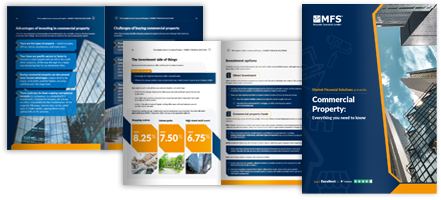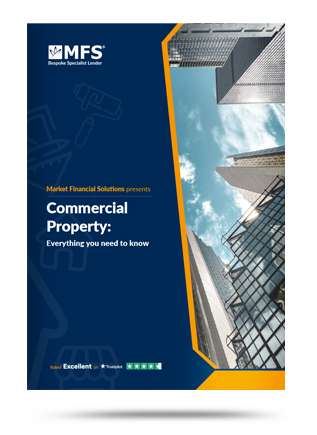Disclaimer
MFS are a bridging loan and buy-to-let mortgage provider, not financial advisors. Therefore, Investors are encouraged to seek professional advice.
The information in this content is correct at time of writing.

Commercial property is proving to be a potentially lucrative investment, with a variety of opportunities available to investors. As the UK moved on from the pandemic, demand for commercial space shot up. Many businesses were desperate to reopen, while expansion plans have been hashed out in a bid to keep the economy ticking.
In the first quarter of 2022, Royal Institution of Chartered Surveyors (RICS) conducted a commercial survey. They found a net balance of +32% of respondents reported a rise in occupier demand at the all-sector level. Specifically, tenant demand rose in the industrial and office sectors. Retail, leisure and hospitality are also seeing rising demand according to Revolution Brokers. Savills estimates there is around £12bn of capital chasing science-related commercial opportunities in the UK.
Investors may be keen to plough money into the commercial world. But once they have done so, they’ll likely want to protect their new investments. In this blog, we’ll explore this, answering what is commercial buildings insurance while breaking down everything investors need to know.
Source: Savills, RICS, Property Notify
What is commercial buildings insurance?
Commercial buildings insurance, or commercial landlord insurance, provides protection for owners who are utilising property for business purposes. Or who are letting out their properties to 3rd parties for commercial use. The tenant will be the business which has a rental agreement in place, legally allowing them to inhabit the property. The insurance should cover the cost of repairing or rebuilding a business premises, or replacing specific equipment.
Property owners should be protected against certain common risks such as burst pipes, flooding or fires. Generally, commercial buildings insurance is split into two key types. Buildings and contents insurance.
Building insurance covers the costs of repairing a business premises if it gets damaged or destroyed. This usually doesn’t cover general wear and tear. Contents insurance is focused on the costs of replacing a businesses’ stock or equipment where they’re damaged or stolen. This may be more of a concern for the firms utilising the space, as opposed to landlords or property owners.
What commercial buildings insurance is paid on will depend on the business sector, or type of assets involved. How high the costs get – or the severity of the risks involved – will likely depend on the type of commercialism at play. There may be limited scope disaster in a small pub as opposed to a logistics plant with lots of moving parts.

Who pays building insurance on commercial property?
Commercial buildings insurance can affect multiple parties, from owners, to tenants and even brokers. However, the actual arrangements and payments come from a singular source. The owner of the property, or the landlord, pays for building insurance. They are referred to as the “insured party”.
However, under commercial lease agreements, landlords can pass the costs on to the tenant. It should be noted that a property cannot be insured twice by two different parties.
While a sensible purchase, there is no legal requirement to have commercial buildings insurance. Given this, investors may be wondering what is commercial buildings insurance even worth if it’s not legally needed? But there could be ramifications for owners who try to avoid paying for it. Would-be tenants may be hesitant utilising a commercial space that isn’t insured.
What are the insurance rates?
Narrowing down average commercial insurance costs can be tricky, given the variation at play. What rates are paid will depend on the location of the property, the type of business and myriad other factors. While the bills will vary, less complex properties are likely to have lower costs. It may be cheaper to insure a small shop than a manufacturing complex.
By examining data on sample rebuild costs and popular UK businesses, nimblefins was able to estimate what the costs may be. Small businesses in the UK could pay around the £218 mark with a £200,000 rebuild cost. Larger companies with rebuild costs around the £1m mark could pay just over £750.
Sector-wise, property used for offices may face lower costs, whereas gardening businesses could be hit by higher bills. It should be remembered these are estimations and insurance costs will mainly be determined by individual circumstances.
Comparison sites can be used to get individual quotes and rates, but they will need a lot of specific details. They’ll likely need information on the property’s location, its age, how long the investor has owned the property, the type of business it’s typically used for and so on.
Looking at the wider picture, property insurance pricing increased 9% in the first quarter of 2022, according to Marsh. It found significant increases were largely imposed on clients with major loss activity, or challenging occupancy or business processes. Examples including food production, warehousing, or waste recycling. As prices rise, we can expect more “what is commercial buildings insurance” queries to come through from the marketplace.
With inflation refusing to calm down, investors will want to cut costs wherever they can. Fortunately, insurance is an area where tangible changes can help. Generally, insurers may offer better rates or even provide specific discounts where owners take precautions to prevent the likelihood of claims.
This can include fitting in higher levels of fire protection or introducing rigorous risk management regimes. As to be expected, this will vary between insurers and clients alike and so to get the best results, communication will be key.
Source: Nimblefins, Marsh, Alan Boswell Group

The Complete
Commercial Property Guide
Everything you need to know
- Extensive introduction
- Lease types
- Regulations & responsibilities
- Finance



